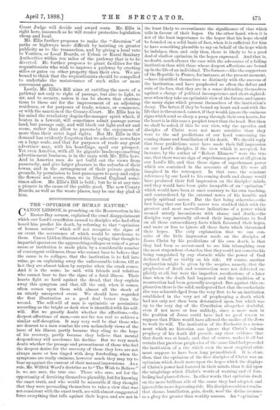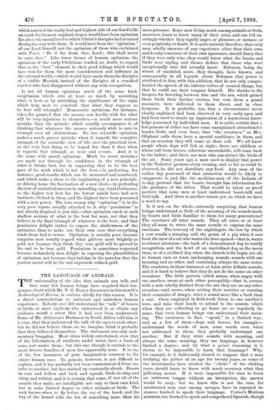THE "OPTIMISM OF HUMAN NATURE."
TON LIDDON, in preaching on the Resurrection in his which selected the really best and highest side of our Lord's life on earth for its most emphatic hopes, would have been optimism far above the moral level to which Christ's disciples had attained during his stay with them. It would have been the " optimism " of our Lord himself, not the optimism of those who exclaimed with Peter, "Be it far from thee, Lord ; this shall never be unto thee." Like lower forms of human optimism, the optimism of the early Christians tended, no doubt, to regard that as the " best " element in their good tidings which would have won for them the most consideration and influence in the external world,—which would have made them the disciples of a visible Messiah, instead of the disciples of a crucified teacher who had disappeared without any wide recognition.
Is not all human optimism much of the same kind, —optimism which errs at least as much by mistaking what is best, as by mistaking the significance of the signs which help men to conclude that what they suppose to be best will triumph ? Democratic optimism, for instance, takes for granted that the masses can hardly wish for what will be very injurious to themselves,—a much more serious mistake than the mistake which usually accompanies it, of thinking that whatever the masses seriously wish is sure to triumph over all obstructions. So, too, scientific optimism makes a much graver mistake when it regards the complete triumph of the scientific view of life over the practical view, as the very best thing to be hoped for, than it does when it regards that triumph as near and secure. And it is the same with moral optimism. Much its worst mistakes are made not through its confidence in the triumph of what it thinks best, but in supposing that to be the best part of its work which is not the best,—in preferring, for instance, good results which can be measured and numbered, and which make a show, to the implanting of a new principle, or driving home the fascination of a new ideal,—in preferring the test of statistical success in spreading, say, total abstinence, to the higher test how far the lowest minds have had new instincts elicited in them, and the highest have been possessed with a new power. The true reason why " optimism " is in the very poor repute usually attached to it, why " pessimism " is not utterly despised, is just this,—that optimists catch at such shallow notions of what is the best for man, not that they believe in the final triumph of whatever is the best; and that pessimists delight rather to expose the shallowness of the optimists, than to make out their own case that everything tends from bad to worse. Optimism is usually poor, because sanguine men usually regard what glitters most brightly as gold, not because they think that true gold will be proved in the end to be true gold. Pessimism is sometimes respected because melancholy men delight in exposing the plausibilities of optimism, not because they indulge in the paradox that the poorest metal will in the end supersede refined gold.



































 Previous page
Previous page